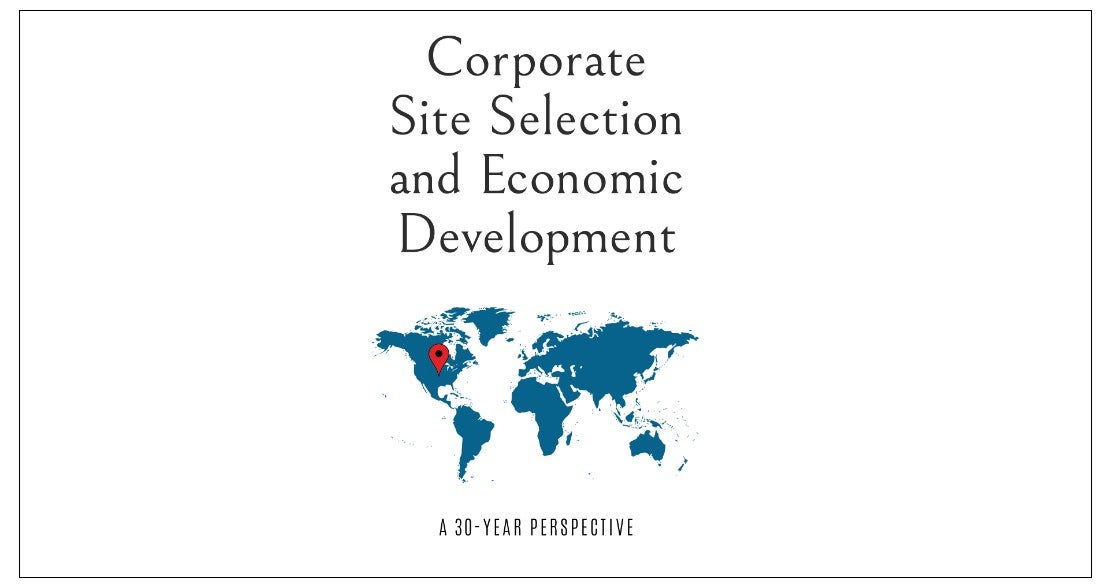Economic development and the process of selecting sites for industrial and headquarters facility investment are the most important business activities in the US and the world today. The process is ever dynamic – it always has been and always will be. The US’s navigation through Covid-19 and its economic impacts has made these activities even more important to its citizens and the health of the national economy.
Successful economic development generates jobs and investments, which result in new revenue that supports incomes, infrastructure, schools, quality-of-life amenities and national defence. Economic development and site selection are inextricably intertwined. Economic development is successful when site locations occur and expand, creating investment and jobs. Not succeeding in economic development at the local, state or national level leads to failure of the broader economy.
Many in the public sector and media don’t seem to understand the importance and value of economic development and site selection, and that’s unfortunate.
Having turned 60 in 2020, I find my career in economic development and site selection has been a fascinating journey; there’s still plenty of runway left. But, it’s time to reflect on what I’ve seen and what I think is coming. Even today, many in the public sector and media don’t seem to understand the importance and value of economic development and site selection, and that’s unfortunate.
So many questions have been asked by the public and media that must be answered. Why should economic developers spend significant financial resources implementing business recruiting programmes? Wouldn’t all this investment just happen anyway?
Why should companies receive tax breaks and other incentives for creating jobs and capital investment? Isn’t economic development another word for corporate welfare? Aren’t site location decisions just political decisions? Can’t the governor or president just tell people where to locate their businesses and then take credit for success?

US Tariffs are shifting - will you react or anticipate?
Don’t let policy changes catch you off guard. Stay proactive with real-time data and expert analysis.
By GlobalDataIn fact, site selection is a complex process driven by a variety of factors that change constantly based on business conditions, business sector and geographic cultures as well as a variety of qualitative factors. These decisions are not simply real estate decisions. When a significant site-selection decision is made, economic resources are created and multiplied over and over, creating an influx of income and wealth which grows and is the foundation of funding for the government and, ultimately, the public good.
It does matter what economic developers do to compete for business locations. It also matters how site selectors are working to provide real-time guidance to their clients related to their site-selection decisions. The economic world is dynamic, especially in light of Covid-19 and the 2020 recession; for anyone in these professions, the thought: “If you do what you always did, you’ll get what you always got” is something to be feared unless you are preparing to be irrelevant.
Economic development: What is it and why do it?
Regardless of challenges such as Covid-19, the US and global economy remains a key issue of interest. So, it’s no surprise that the process of economic development attracts a great deal of attention, some good and some ill-informed, from the public and the press. Often, however, comprehension of what economic development really is and why it’s important is sorely lacking.
Corporations and other entities with the ability to make decisions that create investment and jobs should understand that they are a focal point for economic developers. It is an economic developer’s job to convince targeted businesses to locate or expand in their states or communities to create wealth and contribute to the overall economic well-being of citizens. It is often thought that only big businesses attract the attention of economic developers; however, all sizes are pursued.
What is economic development?
All of us are (or should be) in the economic development business, at least on a personal level. As my mother-in-law reminded me frequently (among other things), you’ve got to put hay in the barn and don’t take out more hay than you put in!
Essential public investments within a community and state should have a financial return, meaning they will spur or ignite more economic growth and job creation.
Economic development on a personal level is simply defined as creating wealth, i.e. taking in more resources than you spend. This is done through a combination of work, investing or other means whereby one earns more cash than he or she spends, allowing payment of bills and investment in quality of life.
On a local and state level, the definition of economic development is the same: taking in more dollars, yen, euros or yuan into a ‘home’ economy than are sent out. When this positive balance occurs on a local or state level, dollars become available for essential public functions such as education, infrastructure development, top-notch medical care and enhancement of amenities that increase the quality of life for its citizens.
Essential public investments within a community and state should have a financial return, meaning they will spur or ignite more economic growth and job creation. Those states and communities that succeed in economic development over the long term typically thrive and prosper; those that don’t lose productive populations and experience an underfunded, withering quality of life. Well thought-out, successful economic development is the most important activity a community and state can undertake.
Corporate Site Selection and Economic Development: A 30-Year Perspective is available on Amazon. For more details, visit here.





